21 Essential AI Courses for Data Scientists in 2025
Discover the top 21 AI courses tailored for 2025, perfect for data scientists seeking to enhance their skills. Explore cutting-edge topics, tools, and techniques to stay competitive in the ever-evolving world of artificial intelligence.
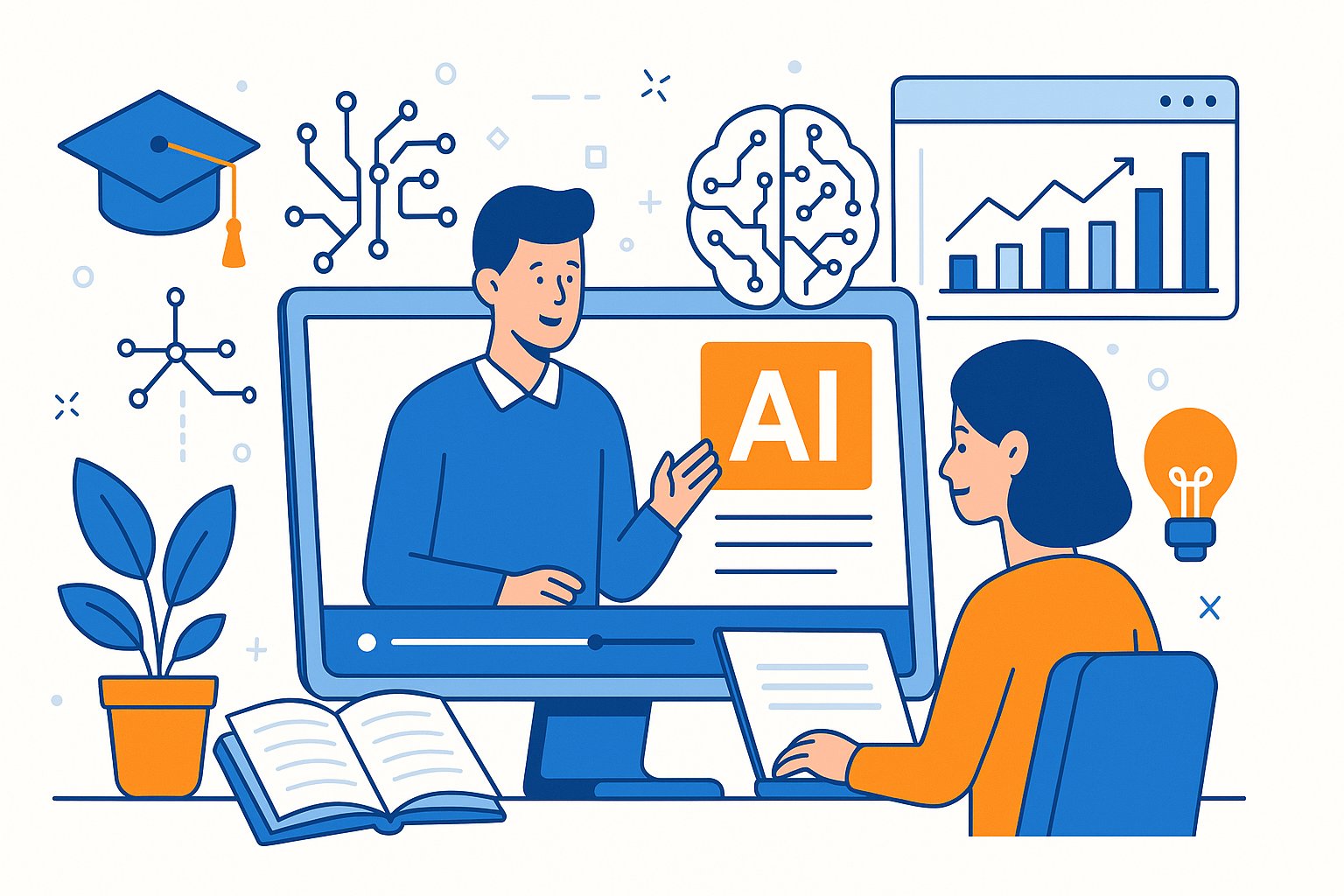
In an era marked by technological advancements, the rise of Artificial Intelligence (AI) has become a pivotal force driving change across industries. For Data Scientists, the urgency to upskill in AI is paramount given its transformative potential. As AI continues to grow and evolve, its impact on job roles and career trajectories is becoming increasingly profound. Professionals in data science must stay ahead of the curve by acquiring AI expertise to not only enhance their skill set but also to ensure their relevance in a competitive job market.
Why AI matters for Data Scientists today
AI is no longer a futuristic concept; it is a present-day reality that is reshaping how businesses operate. According to recent statistics, 69% of businesses have integrated AI into their workflows, highlighting the necessity for Data Scientists to understand and leverage AI tools effectively. The purpose of this article is to guide Data Scientists professionals in selecting the most beneficial AI courses to enhance their expertise and meet industry demands.
The Growing Role of AI in Data Scientists
AI applications are becoming integral in various aspects of data science, including automation, decision-making, and personalization. By automating routine tasks, AI allows Data Scientists to focus on more complex problem-solving activities. Additionally, AI-driven decision-making tools enhance the accuracy of predictions and insights, while personalization algorithms enable more tailored data analysis. These advancements are reshaping tasks and workflows, making the integration of AI skills indispensable for Data Scientists.
Benefits of becoming an AI expert in Data Scientists
For Data Scientists, becoming proficient in AI offers numerous benefits. It not only enhances one's ability to innovate and optimize processes but also opens up new career opportunities. Expertise in AI equips professionals with the tools to drive data-driven decisions and implement efficient solutions, thereby increasing their value within an organization. As the demand for AI skills continues to rise, Data Scientists who invest in learning AI can expect to see significant career growth and job security.
This article will compare 21 AI courses tailored for Data Scientists professionals, including options like the CompleteAI Training, AI For Everyone by Deeplearning.ai on Coursera, and the Artificial Intelligence Nanodegree by Udacity, among others. Whether you're looking to deepen your knowledge or expand your skill set, exploring these courses will provide valuable insights and practical skills necessary for advancing in the field of AI and Data Science.

Comparison: All AI Courses for Data Scientists (Updated Q2' 2025)
| Course Name | Provider | Price | Key Topics | Pros | Cons | Best For |
|---|---|---|---|---|---|---|
| CompleteAI Training | Complete AI Training | $29/month or $8.25/month billed annually | AI for Data Scientists, Video Courses, Certifications | Highest rating, Extensive courses, Daily updates, Affordable pricing | Subscription based | Data Scientists professionals |
| AI For Everyone | Deeplearning.ai (Coursera) | $0-$49.99/month | Non-technical AI introduction | No coding or math required, Comprehensive overview, Taught by Andrew Ng | Not technical enough for data scientists | General learners |
| Artificial Intelligence Nanodegree | Udacity | $1017 for 3 months | Core AI techniques, Projects | Taught by top experts, Hands-on projects | Higher price, Less focus on modern ML | General learners |
| Computer Science for AI Professional Certificate | Harvard University (edX) | $0-$348 | CS fundamentals, AI programming | High-quality instruction, Challenging problem sets | Demanding for beginners | General learners |
| LangChain - Develop LLM Powered Applications | Udemy | $89.99 | LLM applications, LangChain | Hands-on projects, Excellent production quality | Requires Python skills | General learners |
| Large Language Models Professional Certificate | Databricks (edX) | $0-$198 | LLM theory, Python labs | Covers cutting-edge concepts, Experienced instructors | Requires prior ML knowledge | General learners |
| Deep Learning Specialization | Deeplearning.ai (Coursera) | $0-$49.99/month | Deep neural networks, NLP | Comprehensive coverage, Taught by Andrew Ng | Requires prior knowledge | General learners |
| Self-Driving Cars with Duckietown | ETH Zurich | Free; $399 for materials kit | Robotics, AI, Computer vision | Hands-on learning, Unique hardware integration | Advanced prerequisites | General learners |
| Artificial Intelligence (MIT OpenCourseWare) | MIT OpenCourseWare | Free | Classical AI algorithms | Free access, Foundational topics | No interactive platform | General learners |
| CS224N: NLP with Deep Learning | Stanford University | Free to $1750 | NLP, Deep learning | Deep dive into NLP, Free audit option | High difficulty level | General learners |
Understanding AI Training for Data Scientists Professionals
The field of artificial intelligence (AI) is continually growing, providing data scientists with numerous opportunities to enhance their skills and knowledge. With a variety of courses available online, data scientists can delve into specialized areas of AI, including machine learning, deep learning, and natural language processing. This article provides a comprehensive comparison of several leading AI courses to help data scientists make informed decisions about their learning paths.
Course 1: CompleteAI Training
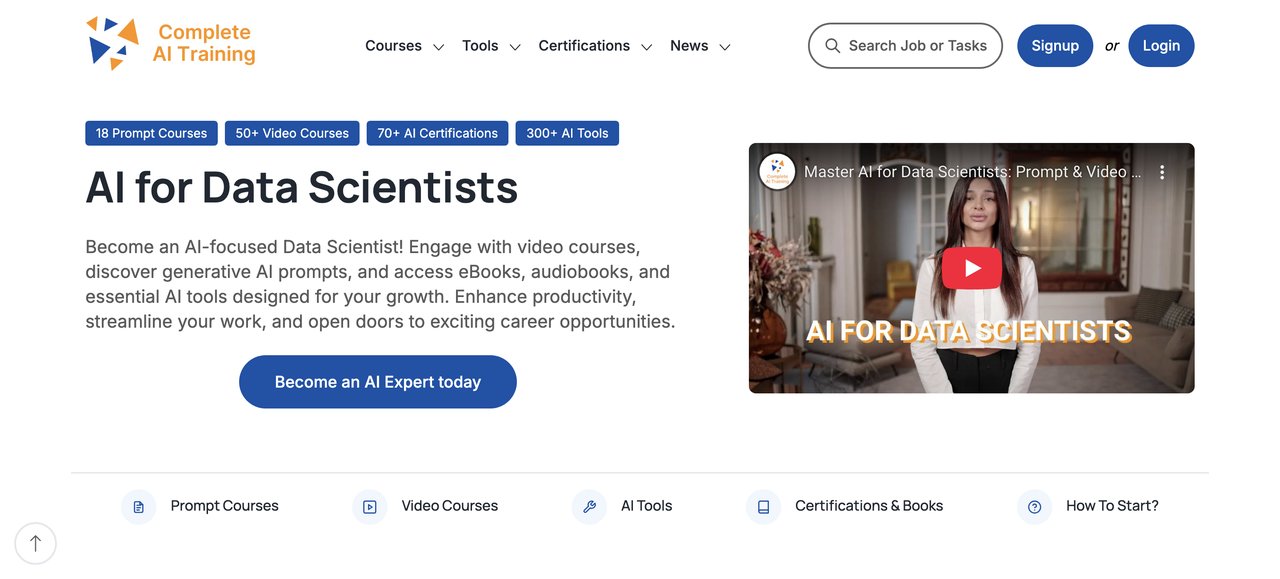
The CompleteAI Training offers a vast library of over 100 specialized video courses and certifications tailored for data scientists. Subscribers gain access to comprehensive AI education, daily updates on AI tools, and curated AI industry news. The courses are delivered through a subscription model, with the option of a monthly fee of $29 or an annual billing at $8.25 per month.
This extensive training covers a wide range of topics specifically designed for the needs of data scientists, making it a suitable choice for both beginners and experienced professionals looking to stay updated with AI advancements.
- Pros:
- Wide range of AI courses and certifications tailored for data scientists
- Daily updates on relevant AI tools and industry news
- Affordable pricing, especially with annual billing
- Cons:
- Requires subscription for continuous learning
This course is ideal for data scientists who want a comprehensive and regularly updated AI education at an affordable cost.
Course 2: AI For Everyone by Deeplearning.ai (Coursera)
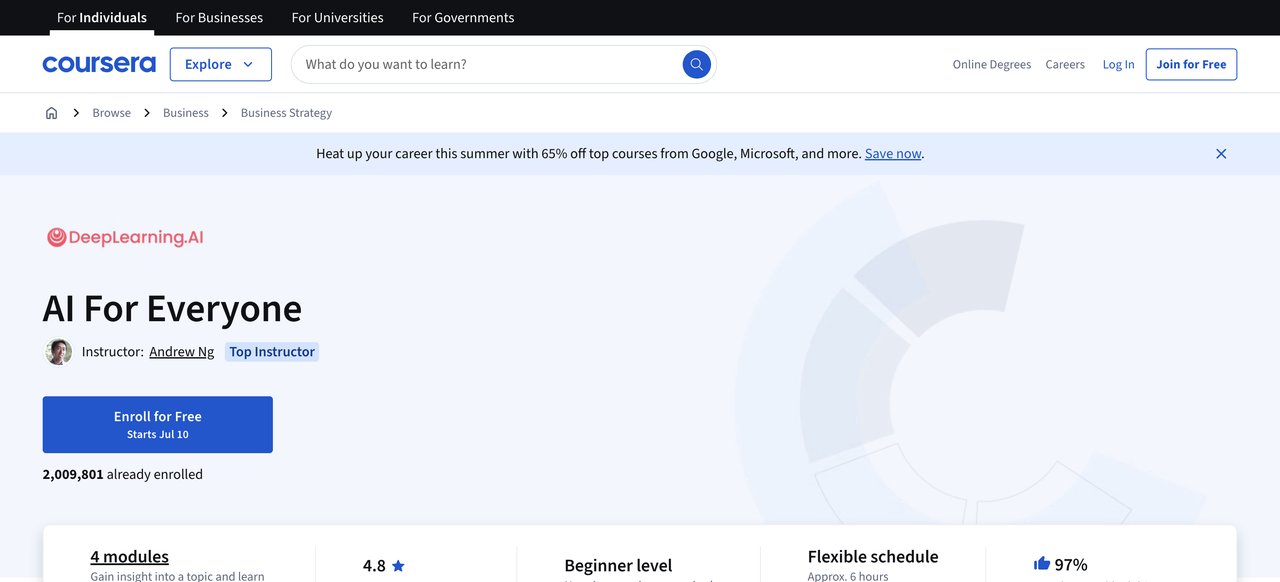
This beginner-friendly course provides a non-technical introduction to AI, exploring its capabilities, misconceptions, and future prospects. Taught by renowned AI educator Andrew Ng, the course requires no prerequisites in math or coding, making it accessible to a broad audience.
Key topics include AI's impact on industries and individuals, ethical considerations, and strategic opportunities for organizations.
- Pros:
- No coding or math prerequisites
- Comprehensive AI overview
- Taught by a leading AI educator
- Cons:
- Not technical enough for data scientists seeking hands-on skills
This course is best suited for newcomers to AI who want a broad understanding without delving into technical details.
Course 3: Artificial Intelligence Nanodegree by Udacity
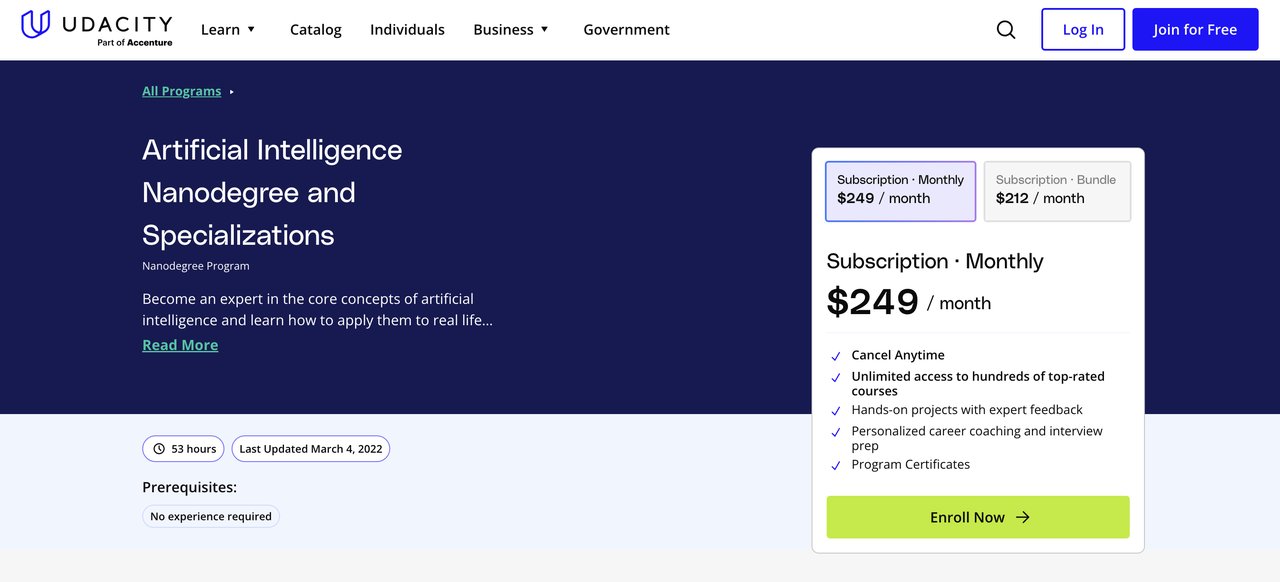
Udacity's Artificial Intelligence Nanodegree covers foundational AI techniques, focusing on classical AI rather than machine learning or generative AI. The course features practical projects like building a sudoku solver and adversarial game-playing agents.
Designed for learners looking to understand core AI concepts, this course provides hands-on experience with classical AI techniques, which are crucial for developing a strong foundation in AI.
- Pros:
- Taught by top AI experts
- Hands-on projects for portfolio building
- Covers classical AI techniques
- Cons:
- Higher price point
- Less focus on modern ML and deep learning
This course is beneficial for those interested in classical AI techniques and practical projects.
Course 4: Computer Science for Artificial Intelligence Professional Certificate by Harvard University (edX)

Based on Harvard's CS50 curriculum, this professional certificate focuses on computer science fundamentals and AI programming. It covers coding, algorithms, data structures, and AI projects like tic-tac-toe and NLP tasks.
With a focus on problem-solving and technical skills, this course is challenging but rewarding for those seeking a deep dive into AI programming.
- Pros:
- High-quality instruction and video production
- Challenging problem sets
- Large active community
- Cons:
- Demanding for complete beginners
- Multiple programming languages covered, which may be complex
This program is ideal for learners with some programming background who want to focus on AI development.
Course 5: LangChain - Develop LLM Powered Applications with LangChain by Udemy

This intermediate-level course targets Python developers interested in building advanced applications using large language models (LLM). It covers Retrieval Augmented Generation (RAG), vector databases, and agent workflows.
Emphasizing hands-on projects like AI chat assistants, this course is excellent for developers looking to apply modern LLM techniques in practical scenarios.
- Pros:
- Hands-on projects with modern LLM techniques
- Instructor is a Google Cloud LLM specialist
- Cons:
- Requires comfortable Python programming skills
- Less focus on underlying AI theory
Python developers interested in practical LLM applications will find this course valuable.
Course 6: Large Language Models Professional Certificate by Databricks (edX)

Designed for developers with machine learning experience, this course covers LLM theory, architecture, and practical applications. Topics include transformers, embeddings, fine-tuning, and prompt engineering.
Combining theory and practice, this course is suitable for those with existing ML knowledge looking to delve deeper into LLMs.
- Pros:
- Covers cutting-edge LLM concepts and practical coding
- Taught by experienced data scientists with PhDs
- Cons:
- Requires prior ML knowledge
- Short duration may limit depth
Experienced ML practitioners interested in LLMs will benefit from this focused course.
Course 7: Deep Learning Specialization by Deeplearning.ai (Coursera)
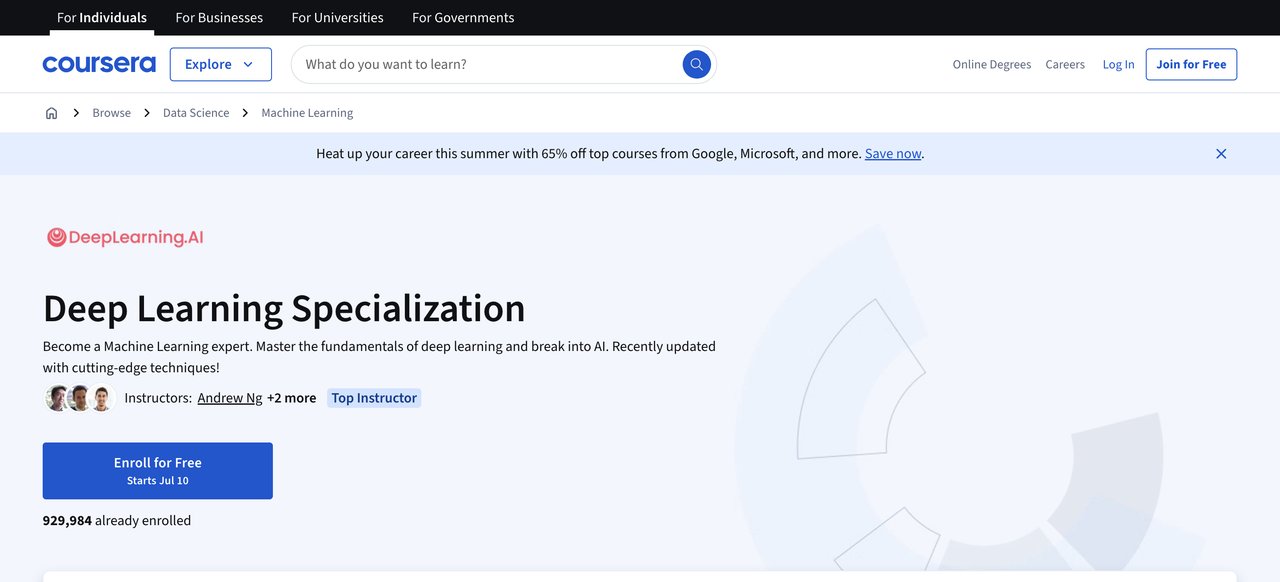
This intermediate-level specialization focuses on deep neural networks, computer vision, and natural language processing. With a strong emphasis on practical coding and theory, it provides quizzes and projects to build hands-on skills in neural networks.
Ideal for those with some math and ML background, the course is taught by Andrew Ng and Stanford instructors, offering comprehensive deep learning coverage.
- Pros:
- Comprehensive deep learning coverage
- Taught by renowned instructors
- Strong focus on practical coding and theory
- Cons:
- Requires prerequisite knowledge in math and ML
- Subscription pricing model
Data scientists looking to specialize in deep learning will find this specialization highly advantageous.
Course 8: Self-Driving Cars with Duckietown by ETH Zurich

This advanced course combines robotics, computer vision, and AI for autonomous driving using a physical kit (Duckiebot). It covers lane detection, object avoidance, and reinforcement learning using Python, PyTorch, and TensorFlow.
Providing a unique hands-on robotics experience, this course is ideal for learners interested in applying AI to autonomous systems.
- Pros:
- Hands-on robotics and AI learning
- Unique physical hardware integration
- Cons:
- Advanced prerequisites required
- Additional cost for hardware materials
This course is perfect for those with a strong background in AI and robotics, seeking practical experience in autonomous driving systems.
Course 9: Artificial Intelligence (MIT OpenCourseWare) by MIT OpenCourseWare
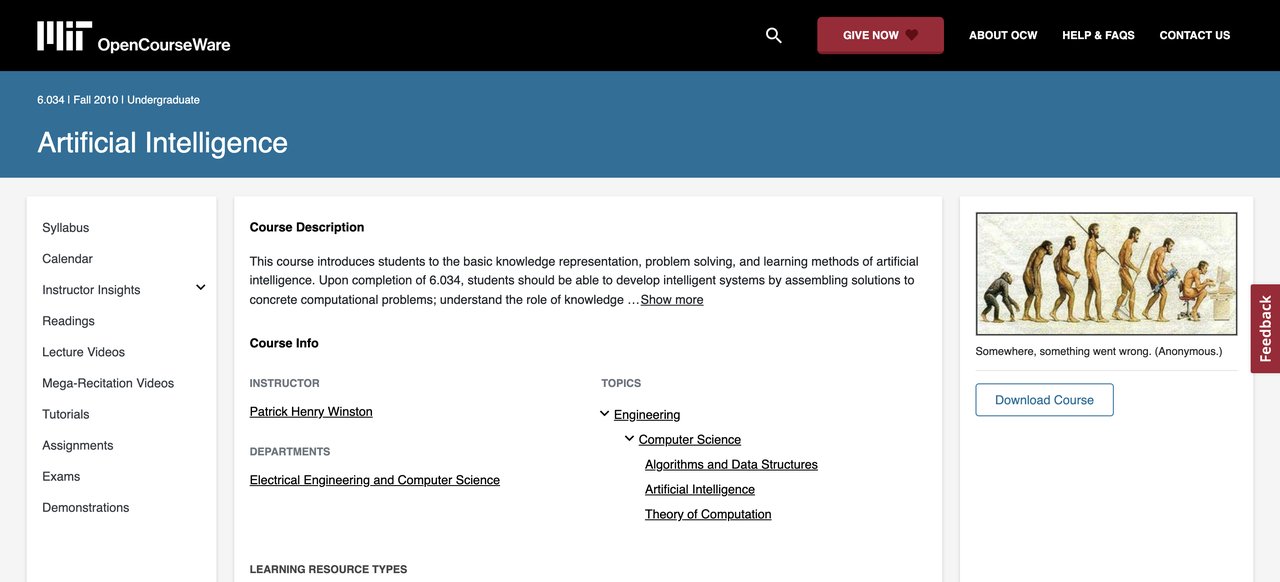
This free, undergraduate AI course covers classical AI algorithms, reasoning, search, machine learning basics, and probabilistic inference. It includes lecture videos, problem sets, and exams, offering a comprehensive academic experience.
While not interactive, the course provides high-quality teaching by Professor Patrick Winston, making it ideal for motivated learners seeking foundational AI knowledge.
- Pros:
- Free access to MIT-level AI education
- Covers foundational AI topics
- Cons:
- No interactive platform or grading
- Older course, less focus on modern ML/deep learning
Independent learners interested in classical AI theories will appreciate this course's academic depth.
Course 10: CS224N: Natural Language Processing with Deep Learning by Stanford University
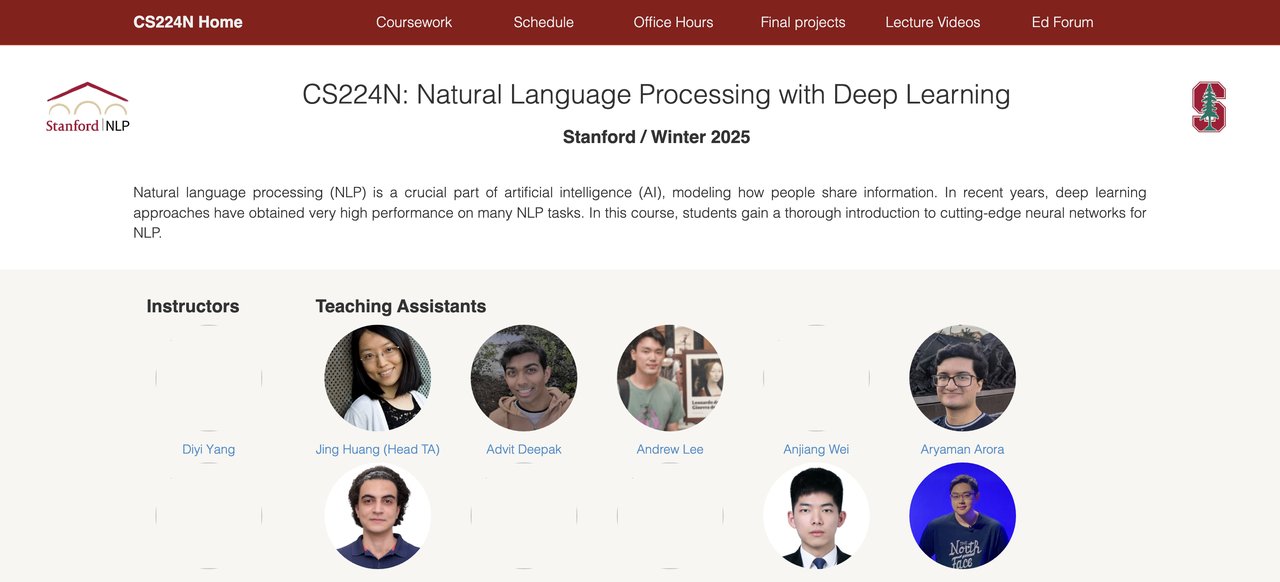
This advanced course focuses on NLP and deep learning, covering word vectors, transformers, sequence models, and advanced training methods. It provides access to Stanford-level lectures and materials, offering a deep dive into NLP.
With a high difficulty level, this course is suited for learners with strong backgrounds in ML and NLP.
- Pros:
- Deep dive into NLP and deep learning
- Taught by NLP pioneer Christopher Manning
- Cons:
- High difficulty level
- Paid certificate is expensive
This course is best for experienced data scientists seeking advanced NLP skills.
Course 11: Introduction to Artificial Intelligence (AI) by IBM (Coursera)

This beginner-level course covers foundational AI concepts, including generative AI, ChatGPT, and natural language processing. Designed to help learners understand AI systems, it is highly rated with over 20K reviews.
Providing an accessible entry point into AI, this course is ideal for beginners looking to understand AI's core principles.
- Pros:
- High rating (4.7/5)
- Suitable for beginners
- Cons:
- Basic coverage might not be enough for advanced learners
This course is perfect for those new to AI seeking foundational knowledge and insights into AI applications.
Course 12: IBM AI Developer by IBM (Coursera)

This professional certificate program covers prompt engineering, software development life cycle, machine learning, Python programming, and generative AI technologies. It includes practical skills such as Flask web framework and unit testing.
Designed for aspiring AI developers, this course offers a comprehensive curriculum with hands-on experience in AI development.
- Pros:
- Comprehensive curriculum for AI developers
- Highly rated (4.6/5)
- Cons:
- Requires a longer time commitment (3-6 months)
This course is suitable for those seeking an in-depth and practical approach to AI development.
Course 13: Fundamentals of Machine Learning and Artificial Intelligence by Amazon Web Services (Coursera)

This course covers core AI and machine learning concepts, including generative AI and applied machine learning using AWS SageMaker. Suitable for mixed-level learners, it offers practical AWS cloud integration.
With free access options, this course is an excellent choice for learners interested in practical AI applications using AWS tools.
- Pros:
- Free access option
- Practical AWS cloud integration
- Cons:
- Mixed difficulty level may be challenging for absolute beginners
Learners interested in cloud-based AI applications will find this course particularly beneficial.
Course 14: Machine Learning by Coursera (various providers including Stanford, Google, IBM)
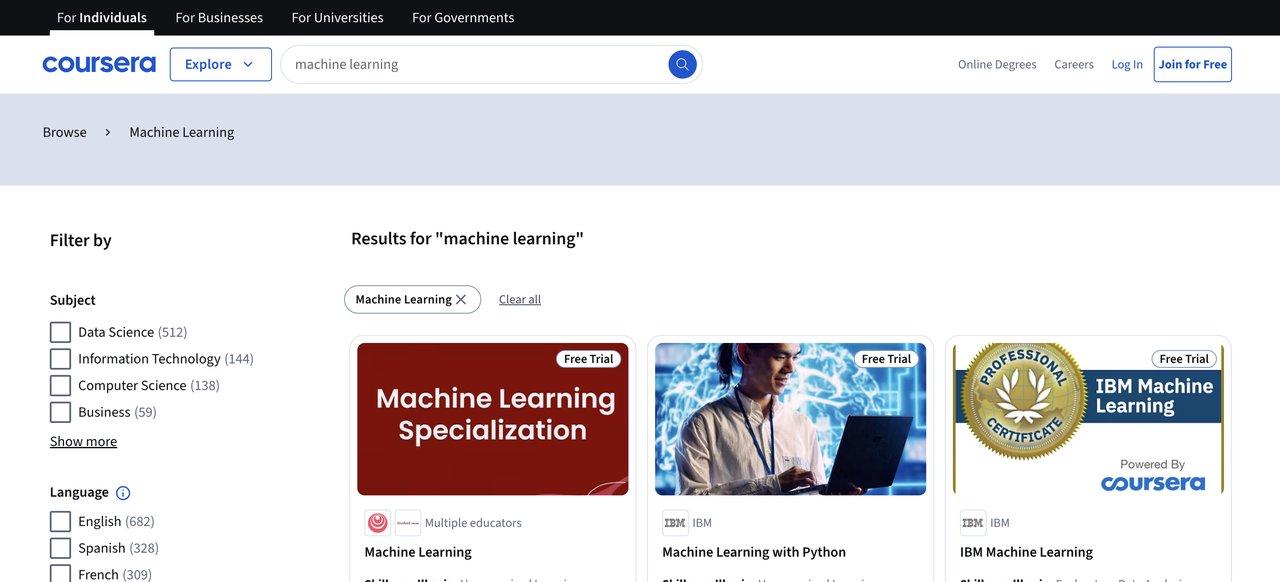
This selection of machine learning courses is suitable for data scientists looking to deepen their understanding of supervised and unsupervised learning, predictive modeling, and algorithm development. With courses from top universities, it offers flexible learning paths.
Catering to a broad range of learners, these courses are ideal for those seeking a comprehensive understanding of ML concepts and applications.
- Pros:
- Extensive course catalog with beginner to advanced levels
- Courses from top universities and companies
- Cons:
- Pricing varies
- Some advanced courses may require longer time commitments
This course selection is best for data scientists looking for flexible learning paths and varied ML topics.
Course 15: IBM AI Engineering by IBM (Coursera)

Focusing on prompt engineering, large language models, reinforcement learning, and applied machine learning, this intermediate-level professional certificate includes hands-on experience with deep learning frameworks.
With a well-rounded curriculum, this course is ideal for data scientists seeking to enhance their engineering skills.
- Pros:
- Comprehensive for AI engineers and data scientists
- Practical and up-to-date content
- Cons:
- Requires prior knowledge in Python and machine learning fundamentals
This course is well-suited for intermediate learners aiming to expand their AI engineering expertise.
Course 16: Generative AI: Prompt Engineering Basics by IBM (Coursera)
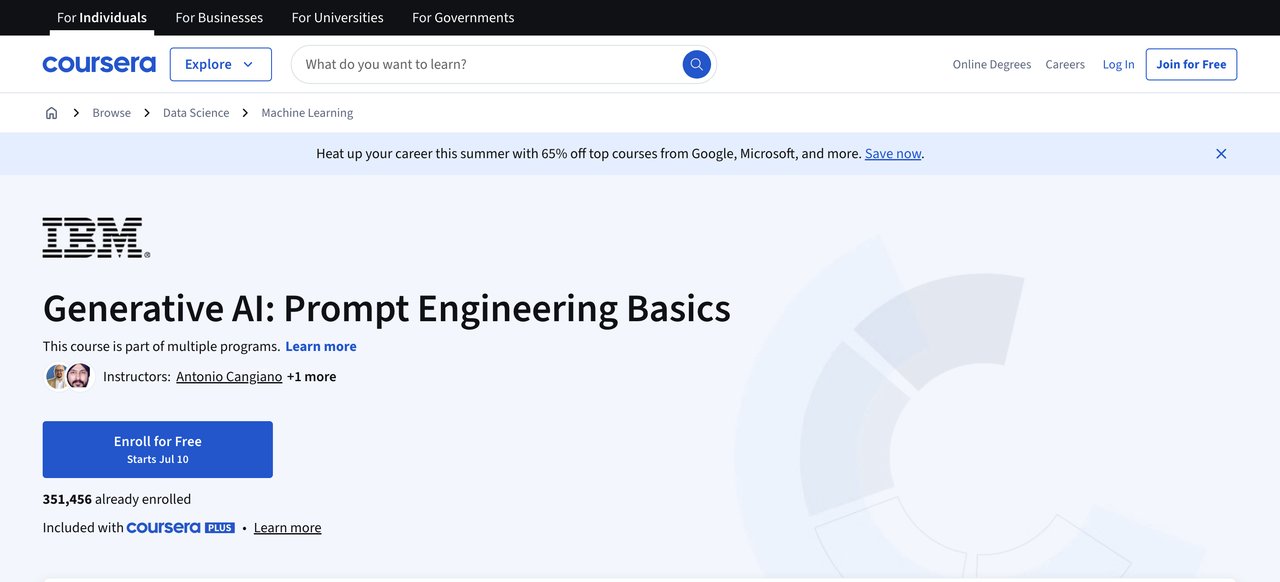
This beginner course focuses on prompt engineering and large language models, providing foundational skills for working with generative AI. It offers an accessible entry into the world of generative AI technologies.
Designed for those new to AI, this course covers essential concepts and techniques in prompt engineering.
- Pros:
- Beginner-friendly
- Focuses on prompt engineering and LLMs
- Cons:
- May not cover advanced topics in depth
This course is perfect for beginners interested in understanding and working with generative AI.
Course 17: Introduction to AI by Google (Coursera)

This beginner course covers AI basics, generative AI, and critical thinking around AI applications. It provides a broad introduction to AI, making it accessible to a wide audience.
With a focus on foundational concepts, this course is ideal for learners new to AI seeking a general understanding.
- Pros:
- Beginner-friendly
- Covers generative AI and critical thinking
- Cons:
- Basic coverage might not be sufficient for advanced learners
This course is suitable for those new to AI, providing a solid introduction to its principles and applications.
Course 18: Python for Data Science, AI & Development by IBM (Coursera)

This beginner-friendly course covers essential skills for data scientists, including Python programming, data manipulation with Pandas and NumPy, web scraping, and automation. It offers a comprehensive introduction to Python for AI applications.
Designed for those with no prior programming experience, this course provides practical tools and skills for data science and AI development.
- Pros:
- Suitable for beginners with no prior programming experience
- Covers a broad range of practical Python tools for data science and AI
- Cons:
- Requires commitment of 1-3 months for completion
This course is ideal for beginners seeking to develop Python skills relevant to data science and AI.
Course 19: Deep Learning by Coursera (deeplearning.ai, IBM, and others)
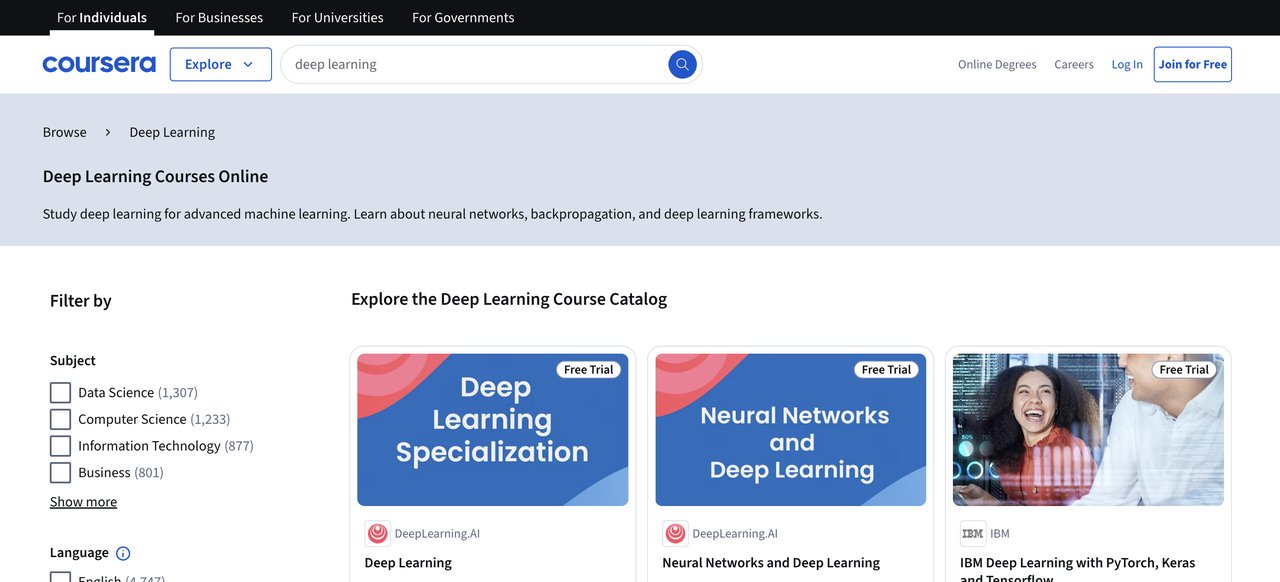
Focused on neural networks and deep learning architectures, these courses are ideal for data scientists looking to specialize in AI-driven predictive analytics, computer vision, and natural language processing. They offer hands-on projects and real-world applications.
Suitable for intermediate to advanced learners, these courses cover cutting-edge AI techniques and practical implementations.
- Pros:
- Covers cutting-edge AI techniques
- Hands-on projects and real-world applications
- Cons:
- Requires some prior knowledge of machine learning and programming
These courses are best for data scientists interested in deep learning applications and advanced AI techniques.
Course 20: IBM Data Science Professional Certificate by IBM (Coursera)
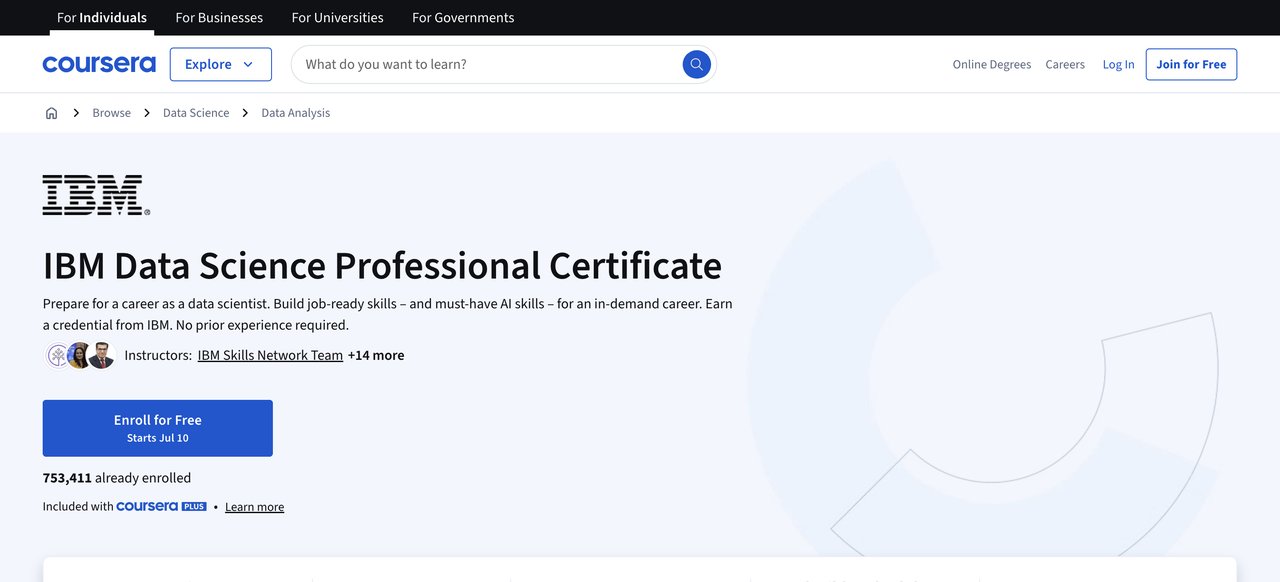
This comprehensive professional certificate covers data visualization, predictive modeling, SQL, supervised and unsupervised learning, and generative AI. It is designed to build a strong foundation in data science and AI skills for career readiness.
Offering practical tools and real-world datasets, this course is suitable for learners aiming to gain industry-recognized expertise in data science.
- Pros:
- Covers a broad spectrum of data science and AI topics
- Includes practical tools and real-world datasets
- Cons:
- Multi-course specialization requiring several months to complete
This course is ideal for those seeking a comprehensive and practical approach to data science and AI skills.
Course 21: Applied Data Science with Python Specialization by University of Michigan (Coursera)
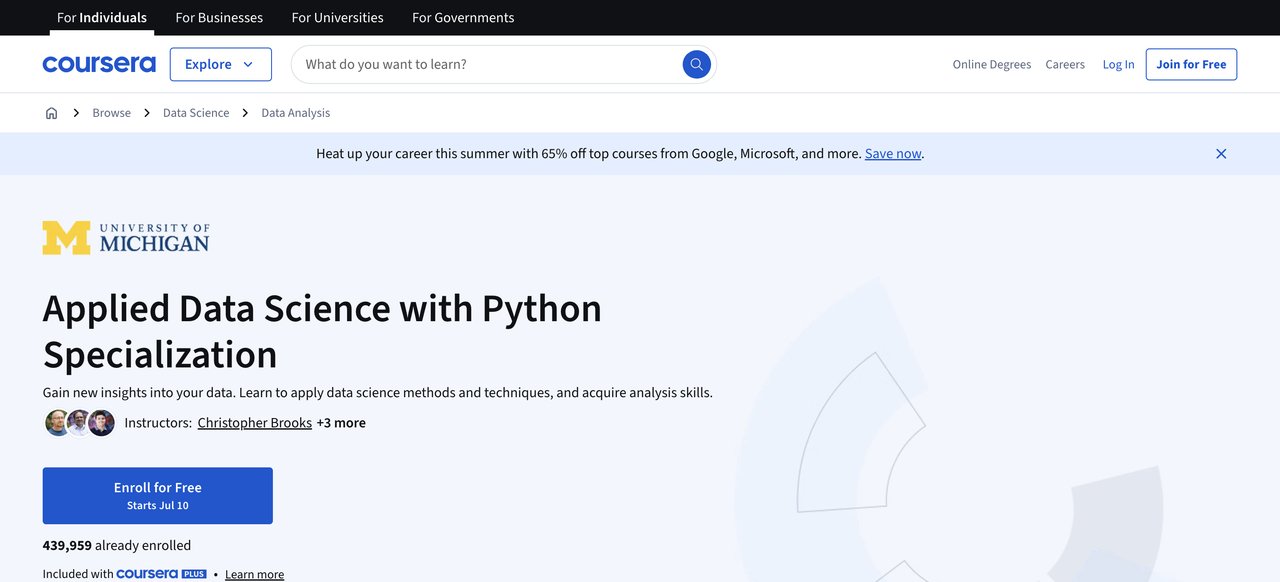
This intermediate specialization focuses on applied machine learning, data visualization, text mining, and natural language processing using Python libraries such as Pandas, Matplotlib, and Scikit-learn. It offers a strong focus on practical Python applications.
With a balance of theory and hands-on projects, this course is suitable for learners with prior Python knowledge.
- Pros:
- Strong focus on practical Python applications
- Covers both machine learning and data visualization
- Cons:
- Requires prior Python knowledge
This course is perfect for intermediate learners looking to enhance their Python skills for data science applications.
Overall Recommendations
For data scientists exploring AI courses, the choice depends on their current skill level, specific interests, and career goals. For a comprehensive and affordable option, CompleteAI Training offers a vast library of resources tailored specifically for data scientists. Beginners may find courses like "AI For Everyone" by Deeplearning.ai and "Introduction to AI" by Google valuable for understanding foundational concepts without technical prerequisites.
Intermediate learners interested in practical implementations might prefer courses like "Deep Learning Specialization" by Deeplearning.ai or "Applied Data Science with Python" by the University of Michigan. Advanced professionals may benefit from specialized courses such as "CS224N: Natural Language Processing with Deep Learning" by Stanford or "Self-Driving Cars with Duckietown" by ETH Zurich for hands-on, cutting-edge AI applications.
Ultimately, each course offers unique advantages, so data scientists should consider their individual learning preferences and professional objectives when selecting an AI training program.




